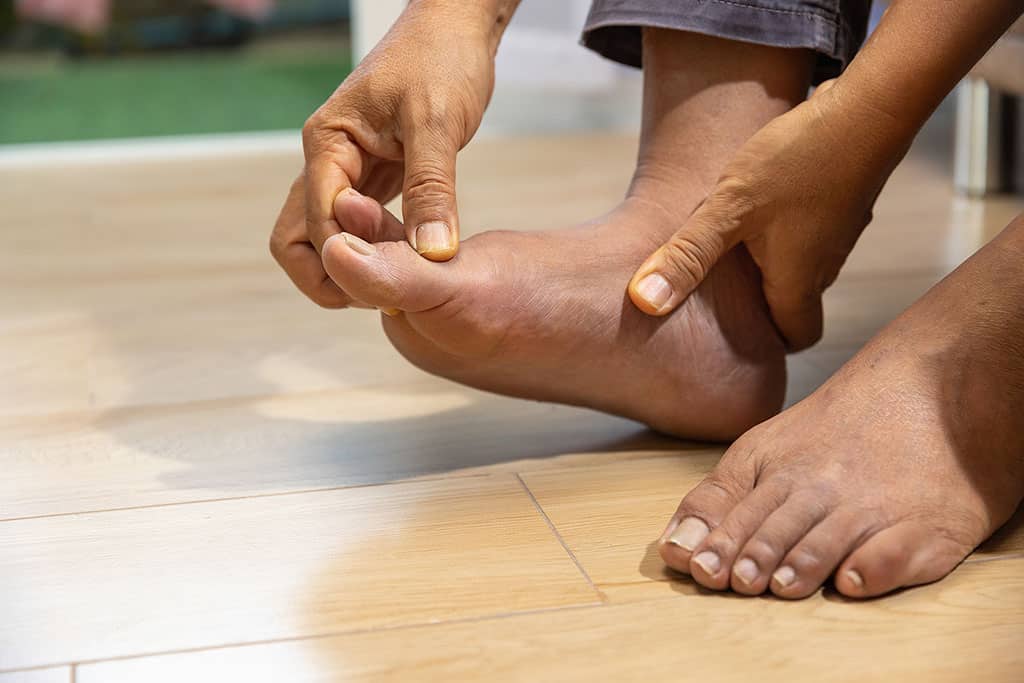Scheduling New Patients Now.
Do you have intense pain and stiffness in your joints? Do they feel like they are “on fire?” If so, you could have gout, a type of inflammatory arthritis caused by a buildup of uric acid.
Gout, which often affects the big toe, makes it difficult for you to function in everyday life. While there is no cure for gout, effective gout treatment from our board-certified rheumatologist in Raleigh can help you minimize flare-ups.
Gout Affects Joints Throughout Your Body
Typically, gout affects the joint in your big toe, but it’s not unusual for it to impact other joints as well, specially those in the:
- Ankles
- Feet
- Elbows
- Wrists
- Hands
Do You Have These Symptoms of Gout?
Schedule an appointment with us if you’re showing any of these classic symptoms of gout:
- Red discoloration in the area
- Swelling
- Stiffness
- Extreme pain
- Excessive tenderness
- Warm to the touch
What Is Causing My Gout?
Your kidneys filter uric acid from your blood. Uric acid is found in purines, which are chemicals in some foods and drinks. Gout occurs when your body makes too much uric acid or when your kidneys aren’t effective at filtering it from your bloodstream.
As a result, the sharp crystals in uric acid continually build up, causing pain, swelling and stiffness in your joints.
Effective Gout Treatment Can Transform Your Life
As mentioned earlier, there’s no cure for this condition. However, gout treatment can minimize your pain and discomfort. At Capital Rheumatology, treatment centers around lowering your level of uric acid through a low-purine diet and, in certain cases, medication may be necessary.
What Foods Should I Avoid If I Have Gout?
You should avoid foods high in purines, and that includes:
- Any sweets or drinks high in sugar
- High fructose corn syrup
- Certain alcoholic drinks
- Organ meats, including liver
- Certain sauces and gravy
- Veal
- Venison
- Yeast extract
- Certain seafoods
- Red meats
- Processed deli turkey
When you work closely with our team at Capital Rheumatology, we’ll provide a detailed list of foods that are safe to consume to minimize your gout symptoms. These foods will decrease the amount of uric acid in your body.
What Medicines Are Used for Gout Treatment?
We tailor treatment to fit your situation, so we recognize not all medicines will work for all patients. Therefore, we take an individualized approach to medicine, carefully evaluating your progress.
Some medicines we may use for gout treatment to manage your symptoms include:
- NSAIDs, such as ibuprofen and naproxen. However, if you have certain health conditions, including stomach ulcers, you should avoid NSAIDs. Speak with us and we’ll be happy to provide guidance.
- Colchicine, a medication that reduces inflammation.
- Corticosteroids, these medications also reduce inflammation, and are given as pills or as an injection.
- Medicines that lower uric acid, including:
- Allopurinol.
- Febuxostat.
- Pegloticase.
- Probenecid
Am I at Risk for Developing Gout?
If you meet any of the following conditions, you could be at risk of developing gout:
- You’re overweight
- You have diabetes
- You’ve been diagnosed with congestive heart failure
- You have high blood pressure
- You have kidney disease
- You have a family history of gout
- You eat foods high in purines (like those listed above)
- You take a diuretic medicine (also known as “water pills”)
- You’re taking immunosuppressants, medicines that suppress your immune system.
Convenient, Comprehensive Gout Treatment in Raleigh at Capital Rheumatology
At Capital Rheumatology, we don’t just treat you, we understand you. We know that pain from rheumatologic conditions can become unbearable, and it’s difficult to describe to those who have no experience with these illnesses.
Therefore, we’ll always take your concerns seriously, and that includes the debilitating pain associated with gout. While there’s no cure for gout, we’ll help you manage the disease to ensure you will be able to enjoy life again.
If you’re experiencing symptoms of gout, you don’t have to suffer through the pain. Contact your primary care provider for a referral.



